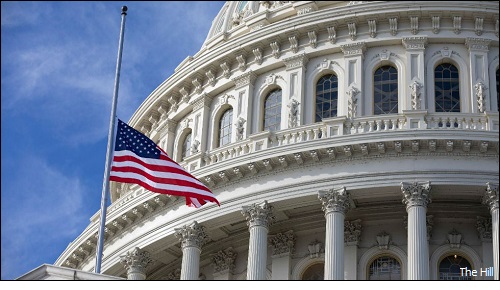
|
|

|
|
| April 20, 2024 |
|
House passes defense bill to establish Space Force, paid family leave for federal workers 
WASHINGTON - The House on Wednesday easily passed the compromise defense policy bill that would grant federal workers 12 weeks of paid parental leave and create a new branch of the military dedicated to space.
The National Defense Authorization Act (NDAA) passed in a 377-48 vote, with many “no” votes coming from progressive Democrats upset after several of their priorities were removed from the legislation. In all, 41 Democrats and 6 Republicans voted "no." The compromise bill picked up Republican support that was absent when the House passed its original version of the defense legislation in July, allowing the chamber to send the $738 billion bill to the Senate. “This was not an easy process,” House Armed Services Committee Chairman Adam Smith (D-Wash.) said ahead of the vote. “We have a divided government. We have a Republican president, a Republican Senate and Democratic House who do not agree on a lot of issues, and those are the issues that tend to get focused on. But what this conference report reflects for the most part is that we do agree on a lot.” Rep. Mac Thornberry (Texas), the top Republican on the committee who voted against the House version in July, added that the final bill is “good for the troops, and it is good for national security, and when it comes to a defense authorization bill, that’s all that really matters.” House passage of the NDAA comes two days after the compromise bill was unveiled following months of negotiations between the Democratic-led House, GOP-led Senate and the White House. President Trump has said he will sign the compromise bill. Negotiators said throughout the months-long talks that the main stumbling blocks were provisions related to Trump’s border wall. The original House bill would have blocked Trump from dipping into Pentagon funds for the wall after he tapped $6.1 billion from the department for his signature project. Ultimately, negotiators decided to leave out wall-related provisions, kicking the issue to the ongoing appropriations process. The final bill also dropped a slew of other Democratic priorities that were in the House bill, including language to reverse Trump’s transgender military ban, block Trump from taking military action against Iran, end all U.S. support for the Saudi-led war in Yemen, force the cleanup of cancer-linked “forever chemicals” called PFAS, block the deployment of the low-yield nuclear warhead and ban new transfers to the Guantánamo Bay detention center. Democrats did secure a major win in the bill with the inclusion of a policy that would grant all federal workers 12 weeks of paid parental leave in what’s being touted as a historic deal to give the benefit to more than 2 million Americans for the first time ever. Progressives, though, balked over the proposals excluded from the final bill. “There are many things you can call the bill, but it’s Orwellian to call it progressive,” Rep. Ro Khanna (D-Calif.) said Wednesday. Still, Smith has defended the bill as "the most progressive defense bill in the history of the country, with Donald Trump as president and Jim Inhofe as chairman of the Senate Armed Services Committee.” “Throughout the negotiations I failed in one way: I was unable to turn President Trump, [Senate Majority] Leader [Mitch] McConnell [R-Ky.] and Chairman [James] Inhofe [R-Okla.] into Democrats and convince them to suddenly accept all of the provisions they despise,” Smith added in a lengthy statement ahead of Wednesday’s vote. “Nonetheless, we have accomplished more with this bill than anyone ever thought possible given the realities of a Trump White House and a Republican-controlled Senate, and we should be proud of that.” The Democratic chairman said that Trump and GOP leaders "would have killed the bill over these provisions" and without the bill "we would have gotten nothing." In a win for Trump and Republicans, the bill would also create Space Force, a new branch of the military aimed at protecting U.S. space assets from threats from Russia and China. The service, which was first proposed by the House in 2017 as Space Corps, has become a top priority for Trump as it elicits huge applause at his rallies. Space Force would be housed in the Department of the Air Force in a structure similar to the Marine Corps’s relationship to the Department of the Navy. The service would be led by the chief of space operations, who would report directly to the secretary of the Air Force and become a member of the Joint Chiefs of Staff. (Source: The Hill) Story Date: December 12, 2019
|